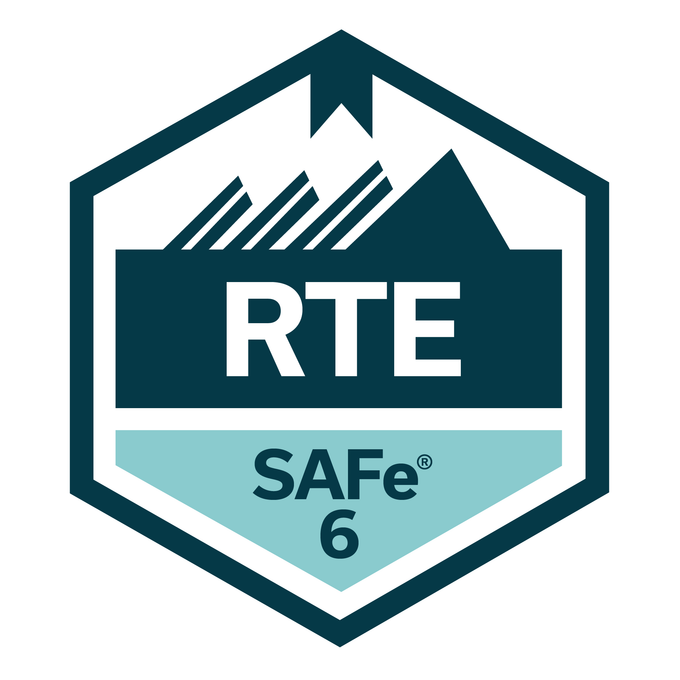
Overview of the RTE Certification
The SAFe Release Train Engineer (RTE) certification from Scaled Agile is designed for professionals responsible for leading and managing Agile Release Trains (ARTs) within the SAFe framework. This certification validates expertise in coordinating large-scale Agile programs, facilitating program-level events, and fostering a Lean-Agile mindset across multiple teams.
Importance of the Certification in the Agile Community
The RTE certification is highly valued in the Agile community, particularly for those in leadership roles within scaled Agile environments. It demonstrates a professional’s ability to handle complex coordination across Agile teams, making it essential for those aiming to lead Agile Release Trains effectively in large organizations.

Key Facts :
- Date Launched: 2018
- Founder: Scaled Agile, Inc.
- Number of Certified Professionals: Thousands worldwide
- Global Recognition: The RTE certification is recognized globally, particularly by organizations practicing SAFe. It is a key credential for Agile leaders who coordinate large-scale initiatives.
Target Audience :
The RTE certification is aimed at Agile coaches, program managers, and senior project managers who work within SAFe environments. It is especially beneficial for:
- Release Train Engineers: Those responsible for coordinating Agile Release Trains and program-level processes.
- Agile Program Managers: Professionals who manage complex Agile programs and need expertise in SAFe practices.
- Agile Coaches and Transformation Leaders: Individuals guiding teams and organizations through scaled Agile practices.
- Scrum Masters and Team Leads: Leaders transitioning into roles that involve cross-team and program-level coordination.
Certification Objectives
The SAFe Release Train Engineer (RTE) certification validates essential skills and knowledge for leading Agile Release Trains effectively, including:
- Managing Program Execution: Knowledge of coordinating multiple Agile teams within a program and aligning them with organizational goals.
- Facilitating Program Events: Skills to facilitate key SAFe events, such as PI Planning, Inspect and Adapt workshops, and Scrum of Scrums.
- Driving Continuous Improvement: Ability to promote a culture of Lean-Agile practices and support teams in their Agile journey.
- Building High-Performing Teams: Skills for creating an environment that fosters high collaboration, transparency, and continuous growth.

Skills and Knowledge Gained

The RTE certification provides professionals with critical skills and knowledge for leading Agile Release Trains. Key areas of focus include:
- SAFe Program Facilitation: Proficiency in organizing and facilitating program-level events to ensure alignment.
- Coordinated Team Management: Skills to support and synchronize multiple Agile teams for cohesive delivery.
- Continuous Improvement Practices: Emphasis on Lean principles and fostering a mindset of ongoing growth.
- Leadership in SAFe Environments: Techniques for building trust, transparency, and collaboration across teams.
Detailed Breakdown of the Certification Process
Pre-requisites: There are no strict prerequisites for the RTE certification, but experience in SAFe or Agile coaching is recommended. Familiarity with Agile Release Trains and SAFe principles is beneficial.
Training Requirements: Completion of the “SAFe Release Train Engineer” course is required. This course, offered by Scaled Agile partners, includes hands-on activities and real-world insights to prepare candidates for the RTE certification exam.
Exam Format :
- Number of Questions: 60
- Question Type: Multiple-choice and multiple-select
- Time Limit: 120 minutes
- Passing Score: 75%
- Retake Policy: Candidates who do not pass can retake the exam after paying a retake fee.
Certification Levels :
The RTE certification is an advanced certification within the SAFe framework, specifically tailored for individuals managing Agile Release Trains.
Recertification :
The RTE certification requires renewal annually, ensuring that certified professionals stay current with evolving SAFe practices.

Key Benefits of the Certification for Organizations

Impact on Teams and Organizations :
Organizations with RTE-certified professionals benefit from more effective program-level coordination, improved alignment across Agile Release Trains, and enhanced delivery efficiency. RTE-certified leaders help teams work toward strategic goals and support continuous improvement across the organization.
Real-World Application :
At companies like Intel and Verizon, RTE-certified professionals have driven program success by coordinating Agile Release Trains, improving cross-team alignment, and ensuring timely delivery of complex projects.
Industry Recognition :
The RTE certification is recognized by top organizations such as IBM, Cisco, and Accenture, which prioritize hiring professionals experienced in managing Agile Release Trains. This global recognition establishes RTE as a valuable certification for Agile leaders.
Case Studies :
At Capital One, the implementation of SAFe with RTE-certified leaders led to a 25% improvement in project delivery timelines and a boost in team collaboration. Another example is Lockheed Martin, where RTE-certified professionals enhanced program transparency and drove better decision-making across Agile Release Trains.
Certification Costs and Value Proposition
Cost of Certification :
The RTE certification exam costs $500 USD. The required “SAFe Release Train Engineer” course typically ranges from $1,500 to $3,000, depending on the training provider and location.
Return on Investment (ROI) :
The ROI for the RTE certification is substantial. Certified professionals report increased leadership opportunities and career advancements within large Agile organizations. RTE-certified leaders are equipped to handle complex, large-scale Agile initiatives, enhancing their career trajectory.
Financial Aid and Discounts :
Scaled Agile, Inc. does not offer direct financial aid, but many training providers provide group discounts for companies certifying multiple employees. Organizations that sponsor training for teams may benefit from reduced rates.

Comparison with Other Certifications

Competitor Analysis :
The RTE certification is often compared to the Project Management Professional (PMP) from PMI and the Certified SAFe Program Consultant (SPC) from Scaled Agile. While PMP focuses on general project management, RTE is tailored for managing Agile Release Trains within SAFe. The SPC certification, meanwhile, emphasizes training and coaching SAFe, while RTE is focused on operational execution.
Unique Features :
RTE stands out for its focus on managing Agile Release Trains and facilitating program-level execution. Unlike general project management certifications, RTE emphasizes program alignment, event facilitation, and continuous improvement in a SAFe environment.
Industry Trends :
As organizations increasingly adopt Agile at scale, certifications like RTE are becoming essential. The RTE certification provides foundational knowledge in coordinating large-scale Agile programs, making it highly relevant for professionals working in globally distributed, Agile-first organizations.
The Future of Agile and This Certification
Emerging Trends :
As Agile practices continue to evolve, certifications like RTE are adapting to address the challenges of remote coordination, Agile at scale, and digital transformation. The RTE certification remains relevant, equipping professionals with the necessary skills to lead Agile Release Trains in complex, modern organizations.
Future Updates to the Certification :
Scaled Agile, Inc. regularly reviews and updates the RTE certification to align with industry best practices. Future updates may include additional focus on remote team facilitation and program performance metrics.
Relevance in a Changing Market :
With businesses facing increasingly complex project demands and rapid technological change, the need for Agile Release Train Engineers is growing. The RTE certification equips professionals with advanced skills in SAFe, making them valuable assets in organizations focused on Agile transformations.

Conclusion
The SAFe Release Train Engineer (RTE) certification is a crucial credential for professionals who lead Agile Release Trains within the Scaled Agile Framework. By validating expertise in SAFe principles, program-level coordination, and continuous improvement, the RTE certification prepares professionals to support and align large teams effectively. As Agile scaling continues to grow, RTE-certified professionals play a critical role in driving efficiency, alignment, and program success, making this certification an invaluable asset for Agile leaders.